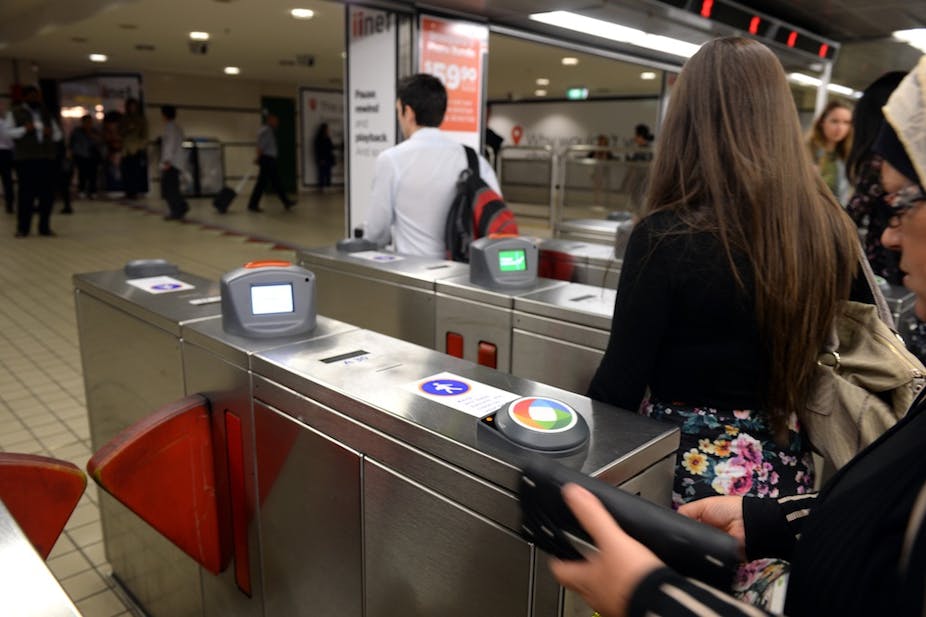Arbitrage is a term often associated with billion dollar hedge funds and opaque finance trades. But it exists in day-to-day life in all sort of ways – from “gaming” public transport, to pitchsiding at T20 cricket matches, and even finding loopholes in airfare pricing.
Sydney-siders have been engaging in “fare arbitrage” since NSW Transport minister Gladys Berejiklian last September invited people to find the cheapest ways to travel using the newly rolled out Opal transport system. Travellers have been sharing their “Opal hacks” online and with viral success.
But a London hedge fund manager who took an arbitrage approach to the extreme to evade £43,000 (A$82,000) in fares has been banned for life from working in the financial services industry.
Meanwhile, at a recent T20 cricket match in Sydney, a professional gambler was arrested as a result of pitch-siding - the sports betting equivalent of what is called “latency” arbitrage.
So when does identifying and exploiting a loophole become something more sinister?
What is arbitrage?
In financial terms, arbitrage is a trading strategy that exploits mispricing between assets such as dual-listed stocks. Arbitrage strategies can be highly profitable - but often come into criticism from regulators. While market purists argue arbitrage contributes to market efficiency, it can sometimes create its own inefficiencies.
Latency arbitrage, for example, is a trading strategy that attempts to take advantage of different speeds in accessing the buy and sell quotes in markets. Essentially, if you can find a better price for an asset before the rest of the market, you can make more money than slower traders.
Critics of this strategy, however, claim it is leading to a technological arms race among traders and actually damaging market efficiency through automated computer algorithm glitch flash crashes.
There are also ethical and regulatory grey areas associated with arbitrage.
The arrest of a British man at Sydney’s T20 match was part of a crackdown on “pitchsiding”, where professional gamblers attending live games exploit slight broadcast delays to gain an unfair advantage over overseas punters.
Pitchsiding (also termed “court-siding” in tennis matches) is not illegal in NSW (the man was reportedly charged with alleged trespass offences); but its potential impact on the integrity of the game means sports authorities such as the International Cricket Council (ICC) are strongly against the practice - while equally struggling to contain it.
Airlines are also cracking down on passengers that find loopholes in fare pricing to pay less for travel. Hidden city fares, cheaper tickets where your intended final destination is technically a stopover on the ticket you purchase, have long been used by fliers despite being prohibited in most airlines’ ticketing rules. Airlines have responded by penalising frequent flier benefits and in one extreme case are now launching legal action against websites that help travellers identify this hack.
So when does fare arbitrage become abuse?
The primary way to beat Sydney’s Opal system involves clocking up eight relatively cheap fares early in a week and then benefiting from free travel for the remainder of the week. But what if you shared your Opal card with a fellow commuter to get to that free travel mark sooner? Or borrow one that has already earned free travel earlier in the week?
While public transport fare arbitrage has been famously encouraged in NSW, and well-documented for public transport in San Francisco, one London commuter’s extreme measures to save on fares has had far-reaching implications for how ethics are viewed in the financial services.
Jonathan Burrows identified and exploited a loophole in London’s Oyster card system on his daily commute. By boarding the train at a station without barriers and failing to “tap on” the former hedge fund manager avoided paying £21.50 per trip from his home station, instead incurring the default fare of £7.20 upon exiting at Cannon Street in the city.
After five years of this fare arbitrage Mr Burrows was detected in November 2013, with the total cost of his fare evasion estimated at close to £43,000 (A$82,000). While he avoided criminal charges associated with his fare evasion through an out of court settlement, his activities have resulted in the UK’s financial regulator banning him for life from working in the markets on the grounds that his actions “demonstrated a lack of honesty and integrity”.
This penalty matches that for fraud and insider trading in the UK, and sets a precedent in the fading line between professional and personal conduct.
Furthermore it is a clear signal of the pressure on financial markets regulators, and their willingness to act, to raise the ethical standards of the industry. With an inquiry into professional and ethical standards in financial services currently underway in Australia, those working and aspiring to work in the industry need to be aware of the changing standards and expectations.

